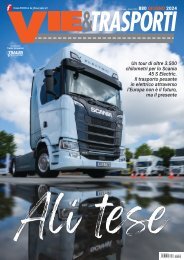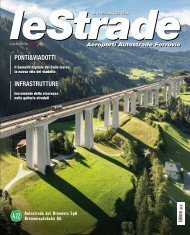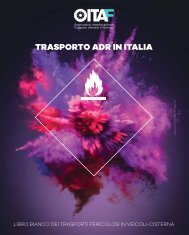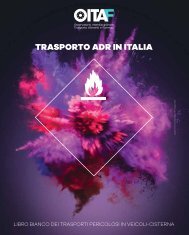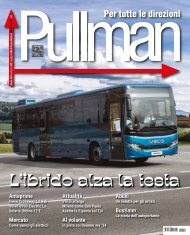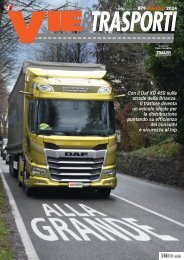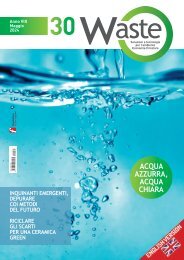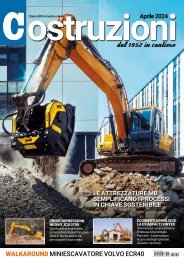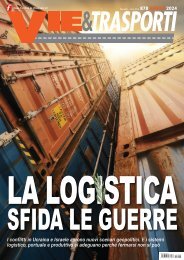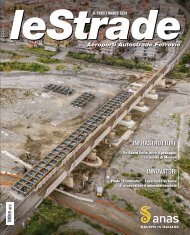leStrade n. 1956 aprile 2024
INFRASTRUTTURE Milano Serravalle Milano Tangenziali La sicurezza in tempo reale GALLERIE La Realtà Virtuale “avanza” nelle gallerie BBT
INFRASTRUTTURE
Milano Serravalle Milano Tangenziali La sicurezza in tempo reale
GALLERIE
La Realtà Virtuale “avanza” nelle gallerie BBT
- No tags were found...
Create successful ePaper yourself
Turn your PDF publications into a flip-book with our unique Google optimized e-Paper software.
“THE UNECE PPP AND INFRASTRUCTURE<br />
EVALUATION AND RATING SYSTEM<br />
(PIERS): A TOOL TO EVALUATE THE<br />
SUSTAINABILITY OF TRANSPORT<br />
PROJECTS IN SUPPORT OF THE SDGs”<br />
The UNECE PPP and Infrastructure Evaluation<br />
and Rating System (PIERS) is UNECE’s PPPs<br />
flagship tool in support of the Sustainable Development<br />
Goals (SDGs). The PIERS methodology<br />
is a platform designed to evaluate and<br />
score PPP and infrastructure projects based<br />
on their contribution to the SDGs. PIERS assists<br />
governments and private companies in<br />
identifying, developing, and implementing initiatives<br />
that not only create value but also prioritize<br />
the well-being of the planet, with a specific<br />
focus on vulnerable populations. PIERS<br />
incorporates elements such as resilience, sustainability,<br />
and circularity, encompassing five<br />
key desirable outcomes: access and equity;<br />
economic effectiveness and fiscal sustainability;<br />
environmental sustainability and resilience;<br />
replicability; and stakeholder engagement.<br />
The methodology’s integration of resilience,<br />
sustainability, and circularity makes it a<br />
powerful tool for enhancing the sustainability<br />
and attractiveness of PPP and infrastructure<br />
projects to potential investors, including in<br />
the transportation sector. In essence, PIERS<br />
is a pivotal tool in promoting sustainable and<br />
impactful infrastructure development while<br />
championing the global pursuit of the SDGs.<br />
PIERS is available online free of charge.<br />
ITF AT THE OECD: “THE FINANCIAL IM-<br />
PLICATIONS OF DECARBONIZING TRAN-<br />
SPORT”<br />
The latest edition of the ITF Transport Outlook<br />
(2023) showed that the transport sector is<br />
currently not on track to achieve the goals of<br />
the Paris Agreement. However, with an acceleration<br />
of our current ambitions globally, the<br />
transport sector could reduce emissions on<br />
2019 levels by up to 80%. For the first time in<br />
this Outlook we have looked at putting a cost<br />
to the road and rail, port and airport capacity<br />
required to service the demand reflected under<br />
two scenarios – one a business-as-usual<br />
“Current Ambition” and the other, a low carbon<br />
“High Ambition”. We estimate that the investment<br />
needed for core infrastructure capacity<br />
will be roughly 5% lower under the High<br />
Ambition scenario (excluding other costs,<br />
such as adaptation and support infrastructure).<br />
That is why we recommend adopting a<br />
long-term vision-led planning, that allows for<br />
strategically aligned investment decisions<br />
that build towards a vision of how the future<br />
transport system will be, and not feeling<br />
bound to perpetuate the system that is. This<br />
presentation by ITF’s Secretary General will<br />
look more closely at some of the financial impacts<br />
of the low-carbon scenario.<br />
financing, as well as the climate resilience of<br />
road infrastructure and networks are currently<br />
fundamental themes for the road and mobility<br />
sector worldwide. Crucial for its future development,<br />
considering sector’s progressive sustainable<br />
transition in the next years.<br />
The Foresight Session, co-organized by<br />
PIARC/World Road Association’s International<br />
Technical Committee 1.3 - Finance & Procurement<br />
and the International Transport Forum<br />
(ITF) at the OECD, with the participation<br />
of leading international institutions and organizations<br />
involved in the transport, road and<br />
financial sector (UNECE, World Bank Group,<br />
European Bank for Reconstruction and Development,<br />
Asian Development Bank, Climate<br />
Bonds Initiative) and PIARC’s International<br />
T.C. 1.4 - Climate change & Resilience, focussed<br />
on them.<br />
Primary topics related to challenges for the<br />
sector, aligned with the 2030 Agenda of the<br />
U.N. (17 SDGs), the Paris Agreement, etc.<br />
Including goals for the progressive decarbonization<br />
of road infrastructure and networks<br />
and the correct development of carbon-neutral<br />
mobility to reach a comprehensive longterm<br />
sustainability for the road and mobility<br />
sector worldwide, considered different implications<br />
(political, financial, fiscal, social, environmental).<br />
Furthermore, latest international trends in<br />
transport and financial sectors highlight and<br />
link successful sustainable policies and best<br />
practices in funding and financing, including<br />
sustainable finance. Given the need to meet<br />
the SDGs 2030 for the sector finding solutions<br />
to the financial constraints and available public-private<br />
funds for necessary significant investments<br />
in road infrastructure projects and<br />
national networks worldwide.<br />
The Foresight Session addressed these following<br />
topics for the road and mobility sector<br />
at the international level (detailed references<br />
available in speakers’ presentations):<br />
• International trends regarding sustainable<br />
funding and financing in the sector, including<br />
decarbonising road infrastructure and<br />
developing carbon-neutral mobility.<br />
• Innovative sustainable finance schemes<br />
and instruments applied to road sector’s<br />
projects, national networks and mobility.<br />
• Sustainable policies, procurement mechanisms<br />
and PPPs aligned with the U.N. SDGs<br />
2030.<br />
Conclusions: technical findings<br />
The technical findings from the range of presentations<br />
included:<br />
• Critical connection between achieving successful<br />
sustainable policy outcomes for the<br />
sector (i.e. decarbonisation/carbon-neutrality’s<br />
goals, socio-economic benefits, road upgrade,<br />
safety), contemporary increasing the<br />
resilience of road infrastructure and networks<br />
(i.e. mobility systems) to climate change’s<br />
impacts worldwide.<br />
Foto 1: Future demand (2050)<br />
for the international transport<br />
sector (source ITF/OECD).<br />
Foto 2: ITF Transport Outlook<br />
2023 (source ITF/OECD).<br />
Foto 3 e 4: PIARC International<br />
TC 1.3 & TC 1.4 2020-2023<br />
(source PIARC).<br />
• Road infrastructure and mobility investments<br />
assessed for compatibility and alignment<br />
with the SDGs 2030, Paris Agreement’s climate<br />
targets (i.e. 1.5 degree, net-zero 2050<br />
decarbonization pathway) and main frameworks<br />
(e.g. European Green Deal).<br />
• Necessary optimization of the investment<br />
decision making’s efficiency to fund resilience<br />
and decarbonisation. Implementing successful<br />
existing and/or innovative mechanisms<br />
and action plans is pivotal for targeting<br />
and prioritising public-private investments<br />
for road networks. Identifying vulnerable infrastructure,<br />
addressing risks, adopting climate<br />
change adaptation frameworks.<br />
• Design as a tool for resilience; strengthen<br />
resilience for sustainable urban mobility<br />
plans. Enhance and fund preventive maintenance<br />
regimes to preserve road assets,<br />
improving sustainability and safety.<br />
• Significant increasing level of financial resources<br />
needed for the sector. Reforming<br />
traditional public budgets, in line with the<br />
sustainable transition, widening a comprehensive<br />
adoption of integrated alternative<br />
funding schemes for road infrastructure<br />
and networks (e.g. alternative fuels taxation,<br />
user charges as tolls and distance-based<br />
pricing, PPPs, value capture). Primary<br />
role of sustainable finance to support investments.<br />
• Sustainable finance is exponentially rising worldwide<br />
(e.g. ESG bonds, loans, guarantees);<br />
just well-established in developed countries,<br />
relevant opportunities for developing countries.<br />
Regarding the ESG bonds market (i.e.<br />
Infrastrutture&Mobilità<br />
68 4/<strong>2024</strong> <strong>leStrade</strong><br />
<strong>leStrade</strong> 4/<strong>2024</strong> 69






